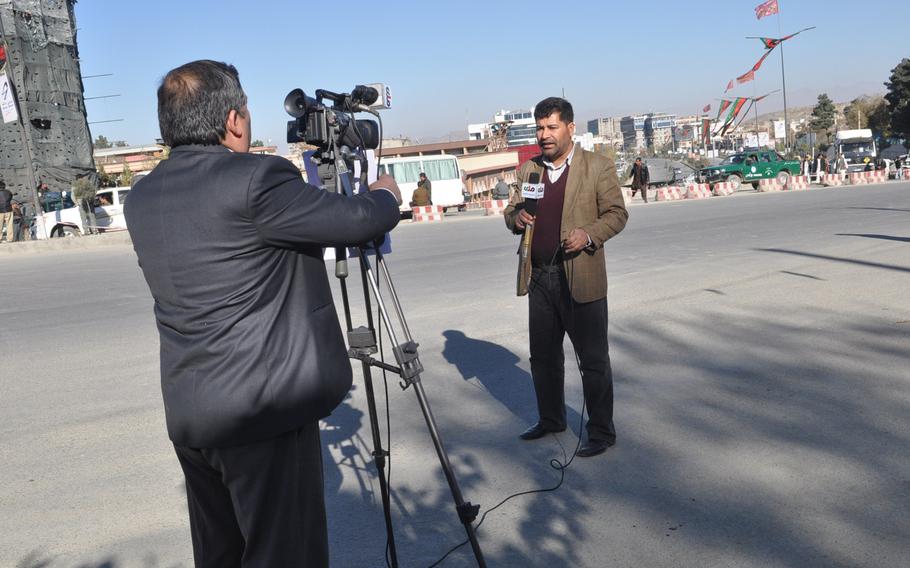Middle East
Immunity of post-2014 US presence in Afghanistan remains unresolved
Stars and Stripes November 22, 2013

A TV reporter sets up a live shot on a road leading the building hosting the Loya Jirga, a council of elders and local leaders from around the country, which begins Wednesday. The council will be considering a proposed U.S.-Afghan security accord that is a pre-condition for the U.S. to keep troops in the country beyond 2014. Heath Druzin/Stars and Stripes (Heath Druzin/Stars and Stripes)
KABUL, Afghanistan — Even after the much-anticipated release of a draft Bilateral Security Agreement between the U.S. and Afghanistan, the issue of the post-2014 American troop presence in Afghanistan remains far from settled.
On Thursday, the Afghan government released a draft BSA during the first session of the Loya Jirga, a meeting of 2,500 delegates President Hamid Karzai called to ratify the agreement. The BSA language released by Karzai’s office concedes immunity from Afghan prosecution for American troops and civilians but is vague on two other key questions — “night raids,” in which American troops enter Afghans’ homes during the night to make arrests, and whether the U.S. will defend Afghanistan from foreign invasion.
Karzai addressed night raids in a speech to the Loya Jirga, in which he said President Barack Obama had promised U.S. troops will conduct such raids only if absolutely necessary.
State Department spokeswoman Jen Psaki said in a Washington, D.C., briefing on Thursday that the language Karzai and the U.S. had agreed to was excluded from the draft BSA posted by the Afghan government. According to Psaki, the agreed-upon draft says: “U.S. forces shall not enter Afghan homes for the purposes of military operations except under extraordinary circumstances involving urgent risk to life and limb of U.S. nationals.”
Though Karzai seems to have capitulated to the most important American demands, he distanced himself from the U.S., saying, “Between me and the Americans, there is no good trust. I don’t trust them. They don’t trust me. This has been clear for 10 years.”
Mara Tchalakov, an analyst with the Washington, D.C.-based Institute for the Study War, said the comment was likely intended to prop up Karzai’s image as an independent and tough negotiating partner, rather than a “Shah Shuja.” Shuja is still reviled by many Afghans for his role as a puppet monarch during the first British invasion of Afghanistan in the 19th century.
Psaki punted on the question of trust, telling reporters the Obama administration was still seeking “clarity” on reports about Karzai’s comments.
“I’m not going to get into a matter of trust or no trust,” Psaki said. “I think that we do believe that both sides agreed to the text in good faith.”
To the surprise and dismay of American officials, Karzai also said Thursday that the agreement — whether or not approved by both parliament and the Loya Jirga — shouldn’t be signed until after the upcoming election, which is scheduled for April 2014. If the election goes to a runoff, a new president might not be chosen until next summer. Karzai has reached the end of his term limit and will not be standing for election, barring a change to the constitution.
Psaki told reporters: “It’s neither practical nor possible for us to further delay (signing the BSA) because of the uncertainty it would create and because it would make it impossible for the United States and allies to plan for a post-2014 presence.”
The U.S. and NATO want to leave a force of several thousand troops in Afghanistan after the end of the current combat mission. Most would likely be advisers and trainers who would continue to work with the Afghan army and police for the next several years.
Tchalakov said American officials would like about a year to prepare their exit plan, which will depend on what kind of force they leave behind. If Karzai leaves the BSA for the next president to sign off on, or if he waits until after the election to sign the BSA himself, that would give the U.S. only about six months.
But Tchalakov said a delay would allow Karzai to build “political cover” for the agreement.
If a heckler who interrupted Karzai’s speech is any indication, that could prove a difficult mission. As Karzai spoke on Thursday, a woman from the Loya Jirga stood up and shouted that the person who signs the BSA will be a traitor to Afghanistan.
“If you say this agreement should be signed, America should be our ally. If you agree with the document and the parliament approves it, the agreement will be signed,” Karzai said.
The meeting of the Loya Jirga has always been designed to defray responsibility for Karzai’s decision, according to analysts.
“All of this independent political posturing of course doesn’t take into account that the consultative jirga was just that (consultative) and that most of the candidates appeared to be hand-picked by his jirga commission,” Tchalakov said. “My hunch is that he probably does support concluding some form of the agreement, but that it’s important for him to be seen as an equal and tough negotiating partner.”
The Loya Jirga will resume work on Saturday.